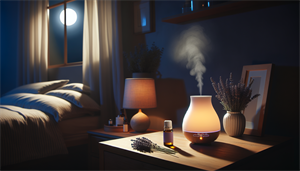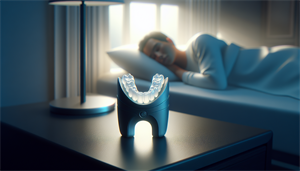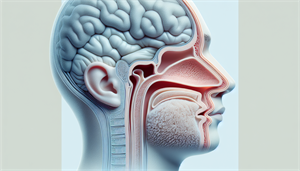Combat sleep apnea naturally—can it be done? Absolutely. This article provides direct access to natural ways to deal with sleep apnea, helping you tackle the problem at its roots with lifestyle tweaks and natural remedies. No fluff, just essential tips and strategies for those ready to improve their sleep quality without medical devices.
Key Takeaways
-
Lifestyle changes such as maintaining a healthy weight, adopting good sleep habits, and limiting alcohol and smoking consumption can alleviate sleep apnea symptoms and contribute to a better quality of life.
-
Natural remedies, including the use of essential oils, throat exercises, and dietary changes and supplements, can support the treatment of sleep apnea and reduce its symptoms.
-
Alternative sleeping positions and aids, complementary therapies such as yoga, breathing exercises, acupuncture, and music therapy, are beneficial in managing sleep apnea, but chronic symptoms should prompt consultation with a sleep specialist.
Lifestyle Changes for Sleep Apnea Relief

Many people with sleep apnea find that simple lifestyle changes can make a big difference in managing their symptoms. These changes can reduce the severity and frequency of apnea episodes, contributing to a better night’s sleep and improved quality of life.
We will examine how maintaining a healthy weight, developing good sleep habits, and reducing alcohol and smoking consumption can alleviate sleep apnea.
Maintain a Healthy Weight
Obesity is closely linked to the severity of obstructive sleep apnea, with excess fat potentially impairing breathing. In fact, research shows that 58% of moderate to severe sleep apnea cases were connected to weight gain. This highlights the vital role of maintaining a healthy weight in managing sleep apnea.
The American Academy of Sleep Medicine recommends a plant-based diet and regular exercise to help patients lose weight. Reducing your risk of developing sleep apnea can be achieved by incorporating fruits, vegetables, nuts, legumes, and green tea into your diet. Weight loss not only reduces sleep apnea symptoms but can also lead to the complete resolution of sleep apnea in some cases.
Adopt Good Sleep Habits
Developing good sleep habits can enhance sleep quality and lessen sleep apnea symptoms. This involves maintaining a consistent sleep schedule and developing a relaxing bedtime routine. A calming bedtime routine might involve activities like reading, meditating, and practicing deep breathing exercises. These practices can be particularly beneficial for individuals with mild sleep apnea.
It’s also important to consider your sleep position. Certain positions, such as sleeping on your back, can contribute to airway obstruction and worsen sleep apnea. Hence, changing your sleep position can significantly alleviate sleep apnea symptoms.
Limit Alcohol and Smoking
Reducing alcohol and smoking consumption can help manage sleep apnea. Alcohol can relax throat muscles and worsen sleep apnea, while smoking can cause airway inflammation and make breathing more difficult.
It is advisable for individuals with sleep apnea, especially obstructive sleep apnea syndrome, to limit their alcohol and smoking consumption. This can prevent the exacerbation of sleep apnea symptoms and contribute to the overall management of the condition.
Natural Remedies to Support Sleep Apnea Treatment

In addition to lifestyle changes, several natural remedies can support sleep apnea treatment. These include the use of essential oils, throat exercises, and dietary changes and supplements.
In this article, we will examine how these remedies for sleep apnea can treat sleep apnea and reduce sleep apnea symptoms.
Use of Essential Oils
Essential oils, such as lavender and eucalyptus, can be beneficial for those with sleep apnea. They can promote relaxation and enhance sleep quality. Lavender oil, in particular, can improve sleep quality by calming the central nervous system and promoting slow-wave sleep, which is especially beneficial for those with sleep apnea.
It is vital to use these oils safely, either through aromatherapy or by applying them topically with a carrier oil. This can help individuals with sleep apnea achieve a better night’s sleep and reduce the severity of their symptoms.
Incorporate Throat Exercises
Throat exercises can enhance obstructive sleep apnea and diminish snoring by strengthening the muscles in the mouth, face, and throat. They can also promote proper tongue positioning, preventing excessive relaxation of throat tissue during sleep.
Effective throat exercises for managing sleep apnea involve techniques such as sticking out the tongue and reaching it upwards towards the nose and downwards towards the chin. It is advisable to engage in these exercises for a minimum of 10 minutes daily, ideally two to three times per day. This practice can significantly impact sleep apnea symptoms, decreasing their severity and occurrence.
Dietary Changes and Supplements
Dietary changes and supplements can also play a significant role in managing sleep apnea. Adopting a Mediterranean diet, known for its heart-healthy benefits, can decrease the severity of sleep apnea symptoms and improve overall health.
In addition, certain supplements, such as magnesium, can alleviate sleep apnea symptoms by supporting optimal levels of GABA, a neurotransmitter that promotes relaxation in the brain and body.
Alternative Sleeping Positions and Aids

Adopting alternative sleeping positions and aids can help manage sleep apnea. These include side sleeping, elevating the head of the bed, and using oral appliances and positional aids.
We will examine how these strategies can alleviate sleep apnea symptoms.
Side Sleeping
The optimal sleeping position for individuals suffering from sleep apnea, including central sleep apnea, is on their side. Side sleeping can aid in managing sleep apnea by preventing airway blockage.
Keeping a side sleeping position with the back mostly straight can notably lessen the severity of sleep apnea, enhance breathing, and maintain the airway open throughout the night. This can lead to an improvement in sleep quality and a reduction in sleep apnea symptoms.
Elevating the Head of the Bed
Another effective strategy is elevating the head of the bed. This can help mitigate apnea episodes and enhance sleep quality by aligning the body in a manner that facilitates improved breathing.
There are specific bed products available in the market tailored for individuals with sleep apnea, such as positional therapy devices like the Zzoma pillow, the Night Shift Sleep Positioner, and the Philips sleep positioner. These products can help in keeping an elevated head position, thus lessening the severity of sleep apnea symptoms.
Oral Appliances and Positional Aids

Oral appliances and positional aids play an important role in managing sleep apnea. These devices, such as mouth guards and tongue stabilizing devices, can reposition the jaw or tongue to open the upper airway, enhancing breathing during sleep.
These appliances can be prescribed by a dentist with specialized training in dental sleep medicine. They offer an alternative for patients who are unable to tolerate Continuous Positive Airway Pressure (CPAP) therapy, a common and effective medical treatment for sleep apnea.
Complementary Therapies for Sleep Apnea
Complementary therapies, such as yoga and breathing exercises, acupuncture, and music therapy or playing wind instruments, can also be beneficial in managing sleep apnea.
We will examine how these therapies can alleviate sleep apnea symptoms for sleep apnea patients.
Yoga and Breathing Exercises
Yoga and breathing exercises provide benefits for individuals with sleep apnea by diminishing the severity of symptoms, enhancing breathing, and addressing sleep-related issues such as insomnia.
Performing yoga exercises, such as Pranayama, can improve the strength, tone, and openness of the upper airway muscles, thereby benefiting individuals dealing with sleep apnea. These exercises should be performed for a minimum of 10 minutes daily for a period of 3 months for optimal results.
Acupuncture
Although it’s still classified as an unproven therapy for sleep apnea, acupuncture has been linked to potential reductions in the apnea-hypopnea index (AHI) and improvements in oxygen saturation levels. This therapy involves the stimulation of specific points on the body to induce nerve signaling that may impact various bodily functions.
Although there are potential risks linked to acupuncture, such as sleep disturbance, decreased sleep quality, and infection, consulting with a qualified professional to ensure the procedure’s safe and effective execution is pivotal.
Music Therapy and Playing Wind Instruments
Engaging in music therapy and playing wind instruments can also yield favorable outcomes for sleep apnea. These activities can:
-
Strengthen airway muscles
-
Reduce symptoms
-
Manage stress
-
Enhance sleep quality
Participation in music therapy or learning to play a wind instrument, such as the didgeridoo, can contribute to the strengthening of the muscles involved in breathing and phonation. This, in turn, can lead to improved lung emptying and filling, contributing to the overall management of sleep apnea.
When to Consult a Sleep Specialist

Despite home remedies and lifestyle changes aiding in managing sleep apnea, seeking consultation from a sleep specialist is necessary if you experience:
-
Chronic snoring
-
Excessive daytime sleepiness
-
Breathing stoppages during sleep
-
Unexplained symptoms
Sleep specialists are highly trained professionals who have expertise in diagnosing and treating various sleep disorders, including sleep apnea. If you suspect that you have a sleep disorder, such as sleep apnea, the initial action is to consult a doctor regarding a sleep study. A sleep study serves to identify the type and severity of sleep apnea, aiding in accurate diagnosis and effective treatment planning.
Summary
In conclusion, sleep apnea is a serious condition that can impact your quality of life. However, with the right combination of lifestyle changes, natural remedies, alternative sleeping aids, and complementary therapies, you can effectively manage your symptoms. Remember, it’s important to consult a sleep specialist if symptoms persist or worsen. Stay proactive about your health and sleep well!
Frequently Asked Questions
Can you heal sleep apnea naturally?
Yes, lifestyle and behavioral changes such as changing sleep positions, avoiding alcohol and certain medications, and exercising regularly can help treat sleep apnea symptoms. These are recommended as a first-line treatment by health experts.
What natural herb is good for sleep apnea?
Passionflower has shown better results in studies for treating sleep apnea compared to Valerian, making it a good natural herb choice for sleep apnea treatment. Valerian and Passionflower have been studied for their effectiveness in treating sleep disorders.
How can I fix sleep apnea at home?
To fix sleep apnea at home, you can try natural remedies such as weight loss techniques, healthy lifestyle changes, side sleeping, raising the head of the bed, playing a wind instrument or singing, and wearing oral or dental appliances. These methods can help alleviate mild obstructive sleep apnea.
What are the benefits of maintaining a healthy weight for sleep apnea patients?
Maintaining a healthy weight can reduce the severity of sleep apnea by preventing excess fat from impairing breathing, leading to improved sleep quality and overall well-being.
How can the use of essential oils aid in managing sleep apnea?
Using essential oils like lavender and eucalyptus can help promote relaxation and improve sleep quality, potentially reducing symptoms of sleep apnea. These oils are known to aid in managing sleep apnea.


